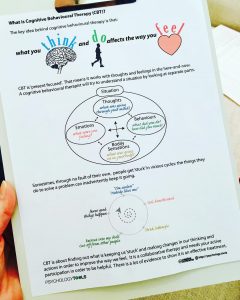CBT for Post Traumatic Stress Disorder (PTSD)
PTSD (posttraumatic stress disorder) is a mental health problem that some people develop after experiencing or witnessing a life-threatening event like a community or natural disaster, an assault, or an accident. People can also develop PTSD after repeatedly or chronically experiencing traumatic events in childhood or adulthood.
After experiencing a traumatic event or events, it’s normal to have disturbing memories, have sleep disturbance, and feel on edge or “on guard”. Doing typical or routine daily activities like going to work or school or spending time with loved ones might feel challenging. However, most people start to feel better after a few months or weeks.
You may have PTSD if these symptoms persist for more than a few months. For some people, PTSD symptoms may come and go over time or start later, but if this goes on longer then a few months, it is a good idea to seek professional support from a therapist who is knowledgeable in post traumatic stress reactions and PTSD.
This is because PTSD can keep a person from living the life they want to live. Sometimes, when a person perceives their level of anxiety to be very high, they begin to choose to avoid situations that seem to prompt anxiety and intrusive memories. They might find themselves doing compulsive behaviors (or mental rituals) to lessen anxiety like checking and re-checking for safety. The more a person engages in these rituals and/or avoids situations that make them anxious, the more they lose confidence and their natural ability to know when situations and thoughts don’t present real danger; they live in a cycle of fear and avoidance (and sometimes ritualizing). Over time, life becomes smaller, less enjoyable, and the person may feel sad or depressed. It is not uncommon for sleep to become unrestful and fraught with nightmares.
The right treatment can help a person get back to living the life they want to live. Cognitive behavioral therapy (CBT) is a model of therapy in which a trained therapist helps a person understand and then change thoughts, feelings, and behaviors to achieve therapeutic goals. Research by psychologists has determined that CBT, done well, works to treat post traumatic stress disorder. It is evidence-based. CBT also works well to help people with less severe forms of anxiety that might not fit into a diagnostic category but still interfere with a person living they life they want to live. Additionally, CBT works to treat depression, insomnia, and many other behavioral and emotional issues that many people experience in combination with PTSD. Compared to some other forms of psychological treatment that might be more confined to talking in the therapy room, it is an “active” treatment. People who engage in CBT complete “homework” tasks designed to apply what they learn in the therapy office to their lives, where real change happens. Research suggests that people who actively participate in CBT experience reductions in anxiety, situational avoidance, compulsive behavior, depressive symptoms, and improvements in overall quality of life. We have specialized training in use of CBT to help people overcome PTSD, in fact, Dr. Nathan Mascaro, Ph.D., ABPP and Dr. M. Kathleen Holmes, Ph.D. both worked within the Department of Veterans Affairs specifically helping to treat veterans with PTSD. Drs. Mascaro and Holmes use the most empirically supported and scientifically grounded cognitive-behavioral interventions to treat PTSD and co-occuring problems, frequently employing approaches such as Acceptance and Commitment Therapy, Prolonged Exposure Therapy, Cognitive Processing Therapy, Exposure and Response Prevention, CBT for Depression, Interpersonal Therapy for Depression, Dialectical Behavior Therapy (DBT) Skills Training, and CBT for Insomnia.
What about medication? Some people who have anxiety are prescribed certain medications called benzodiazapines and/or antidepressants. These medications can help to relieve anxiety, especially in the short term. However, research suggests, for long term relief from anxiety and situational avoidance, it is important to change the way one thinks, feels, and behaves in life. In other words, anxiety often comes back after the medications are stopped unless a person has learned new skills and ways of thinking through CBT. So, research suggests that CBT either in combination with medication treatment or alone, leads to more long-lasting benefits than medication alone. Because of this, if you choose to take medications while engaging in CBT with me, we will gladly work with your prescribing physician to coordinate care with your permission.
